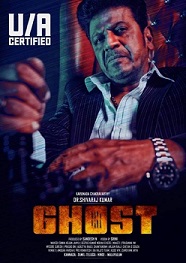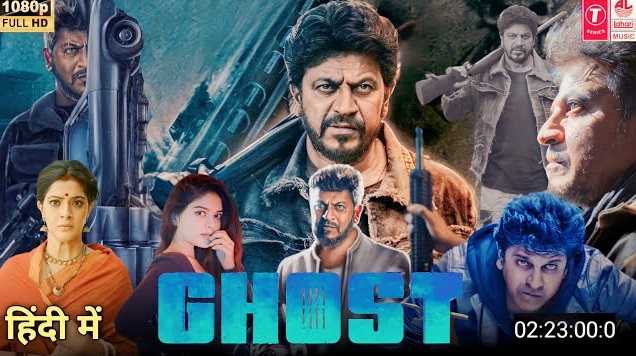|
|
||
|
Pro Tools
FILMFESTIVALS | 24/7 world wide coverageWelcome ! Enjoy the best of both worlds: Film & Festival News, exploring the best of the film festivals community. Launched in 1995, relentlessly connecting films to festivals, documenting and promoting festivals worldwide. Working on an upgrade soon. For collaboration, editorial contributions, or publicity, please send us an email here. User login |
Ghost, Review: Jailhouse Rock
Ghost, Review: Jailhouse Rock ‘The Warden threw a party in the county jail, The prison band was there and they began to wail’ wrote Jerry Leiber and Mike Stoller, for the legendary Elvis Presley to sing, in the 1957 film, Jailhouse Rock, a jail film, as the title suggests. 66 years later, we have an Indian jail film that draws no inspiration from Jailhouse Rock. In fact, it is not clear at all where the inspiration, if any, for Ghost, came from. Could it have come from a ghost? A ghost-writer, perhaps? Made at a pace that makes rock music look 2000 years old, Ghost might prove unintelligible to ears that are used to normal sound and visuals. Sound and fury unravel at full blast, with all kinds of arms and armaments dotting the sound-track, not to mention bare-handed combat, with an ear-splitting background ballad, on cue, for every scene. Ghost gives you no time to think. So, think again, before you go to witness this apparition. A high-security prison is taken over by an unknown entity and his accomplices, and many hostages are taken, including a Minister, who had come to attend the function of formally privatising the prison, a cause he had been championing for almost ten years. An ace cop, Charan Raj, is assigned the task of dealing with the criminals. This leads to a cat and mouse game. The mysterious Mastermind makes quite mundane demands, while Charan Raj tries to get information on the insurgents through all possible sources. He is out-maneuvered at every stage, as the Mastermind plays with electricity, disguises, infiltration into the police camp, etc. The police have captured one of his men, but he is badly injured. A stone-hearted man, Charan Raj, decides to interrogate the captive. It does not work. Charan Raj learns that the whole idea of privatising the prison was mooted because a caché is hidden somewhere in the prison, and the Mastermind has no other objective than to unearth that treasure and decamp with it. After communicating with Charan Raj through one of his gang members, using a video link, several times, the Mastermind agrees to a meeting with him, face to face. At that meeting, sparks fly, and Charan Raj warns the Mastermind about facing the full might of the law. In flashback, we see that in a raid in Oman, 200 kg of illicit gold was seized, but some intelligence sources alleged that the seizure was actually of 1,000 kg. Only 200 kg were accounted for officially, so where did the remaining 800 kg go? They were hidden in the prison. One man was wrongly accused of misappropriating the gold, and committed suicide out of shame. And the man who has come to retrieve it is called Ghost. Though a man in flesh and blood, Ghost is indestructible. It is literally a cat and mouse game, minus the cat. There is a trained mouse that is used a messenger by the antagonist! Ghost needed applied scientific knowledge, and the three writers, Prasanna V.M., director M.G. Srinivas (credited with the story) and Maasthi Upparahalli have the requisite database. Dialogue might have suffered in translation, as most lines are full of claptrap one-liners, moralising (from the speaker’s point of view) or posturing. Full of CCTV cameras, AM radio broadcast used as a scanner, drones, remote operated mini-boats, video conferencing (well, granted that is not rocket science), fake bullets, decoding facial clues, written messages that can only be read under a fire, and the list goes on. Some of these are effective, while some others are either too far-fetched or wasted. The concept borders on the incredible, but the writers roll out one punch after the other, to stop you from reflecting or analysing. Among various categories of prisoners, often with fake numbers, commandos in prisoner attire, police officers revealed to be corrupt in the middle of the operation and changing sides, it is easy to lose track. But Ghost never shifts its focus from Charan Raj and Ghost. Loose ends are the hallmark of Ghost. A TV reporter tells her father that she is sorry he went to jail for her. Why he was jailed is never told. Deaths of two important characters are not explained, but a hint is given about one of them. Ghost used to be such a dreaded criminal that the Chief Minister (CM) lay prostrate at his feet, to ask him to spare his son. Ghost kills him nevertheless, right in front of his eyes, with a whole battalion on stand-by. The son had committed a heinous crime, of the type no sane individual would. And such crimes are not committed on the spur of the moment. Why had the CM not done anything to reform his son’s character so far? Ghost walks into a pet shop where the pets are trained to perform tasks and says he needs a pet for a film shooting. The owner, with his sixth sense, I presume, guesses that he is not from any film unit, tells him as much, but joins hands with him in the jail heist, being present there to guide the mouse in carrying messages written on special paper, to and fro. Ghost is no commando or WWF champ, yet, he is able to dispense with 10-20 opponents with ease. Made in the Kannada language, and dubbed in other tongues (we saw the Hindi version), Ghost is directed by M.G. Srinivas, a multi-faceted personality: choreographer, radio jockey, lead actor and director. His recent works as director include Srinivasa Kalyana (also lead actor), Birbal Trilogy Case 1: Finding Vajramuni, and Old Monk. He is married to a journalist, which might have prompted him to give a reasonable chunk of footage to the female TV journalist in Ghost, the only one be singled out for this honour. Of the two lead characters, Ghost emerges the clear favourite, checkmating all the moves of Charan Raj. This gives the film a lop-sided stance, as Charan Raj is reduced to just barking commands and letting off steam. He declares that he is cold-blooded, and that even the death of his wife did not make him cry. But the only person he really shows his machisimo is a critically wounded opponent, who is on life-support on a hospital bed. For a film that moves at rocket speed, the last thing it needed was flashbacks. Not one, not two, not three…I lost count. There are several face-offs that result in only bombast. With bullets exchanged on both sides, there is not a single casualty on the police side. This should have raised eyebrows early on, but the fact is noticed only near the climax.
As the genius – Ghost/Dalavayi/Anand-who masterminds the break-in, Shiva Rajkumar (eldest son of the Kannada superstar, late Dr. Rajkumar) is fairly good. At 61, he is agile and active. He makes good use of his eyes, which have been made blue. And shows grim determination. Coming to his action scenes, they are to be seen to be believed. Charan Raj is played by Jayaram, 57, who is a professional mimicry artiste and an itinerant singer. He super-charges his role, but it does not offer him much scope. Also, he is a bit too stocky to be a crack police officer. It is ironical that an officer of his calibre is reduced to near impotency against an unknown nemesis. Prashant Narayanan, who plays the Minister, is known for his work in several Hindi films. Anupam Kher has a cameo. Others in the cast are Archana Jois, Satya Prakash, H.G. Dattatreya and the director, M. G. Srinivas as Mahesh Das. Incidentally, Srinivas prefers to be addressed as Srini. In an sealed, huge prison, where most of the film is shot, cinematography is a challenge, with the greys balancing the light sources. Mahendra Simha does a good job of it. Editing in this film means many shots of 4-5-6 frames and a breakneck pace. Deepu S. Kumar is up to the task. Arjun Janya gives us so much variety of genres in just one film that it takes some believing. But if you do watch this film, try having your ear-phones on, so that the blows are softened. Ghost is nothing if not stylish. Ghost is an experience. Like the existence of ghosts, you either believe in it or you don’t. It is dazzling. It is razzling. It is very easy to get sucked in. It is like war - they say so themselves, halfway. It is like quagmire. It is like quicksand. It is like a tornado. It is like a hurricane. It is like an earthquake. If that’s your scene, see and be seen. Rating: ** Trailer: https://youtu.be/zUOrzMTgVKk 19.10.2023 | Siraj Syed's blog Cat. : Anupam Kher Archana Jois Arjun Janya Deepu S. Kumar Elvis Presley H.G. Dattatreya Jayaram Jerry Leiber M.G. Srinivas Maasthi Upparahalli Mahendra Simha Mike Stoller Prasanna V.M. Prashant Narayanan Satya Prakash Shiva Rajkumar
|
LinksThe Bulletin Board > The Bulletin Board Blog Following News Interview with IFTA Chairman (AFM)
Interview with Cannes Marche du Film Director
Filmfestivals.com dailies live coverage from > Live from India
Useful links for the indies: > Big files transfer
+ SUBSCRIBE to the weekly Newsletter Deals+ Special offers and discounts from filmfestivals.com Selected fun offers
> Bonus Casino
User imagesAbout Siraj Syed Syed Siraj Syed Siraj (Siraj Associates) Siraj Syed is a film-critic since 1970 and a Former President of the Freelance Film Journalists' Combine of India.He is the India Correspondent of FilmFestivals.com and a member of FIPRESCI, the international Federation of Film Critics, Munich, GermanySiraj Syed has contributed over 1,015 articles on cinema, international film festivals, conventions, exhibitions, etc., most recently, at IFFI (Goa), MIFF (Mumbai), MFF/MAMI (Mumbai) and CommunicAsia (Singapore). He often edits film festival daily bulletins.He is also an actor and a dubbing artiste. Further, he has been teaching media, acting and dubbing at over 30 institutes in India and Singapore, since 1984.View my profile Send me a message The EditorUser contributions |





























